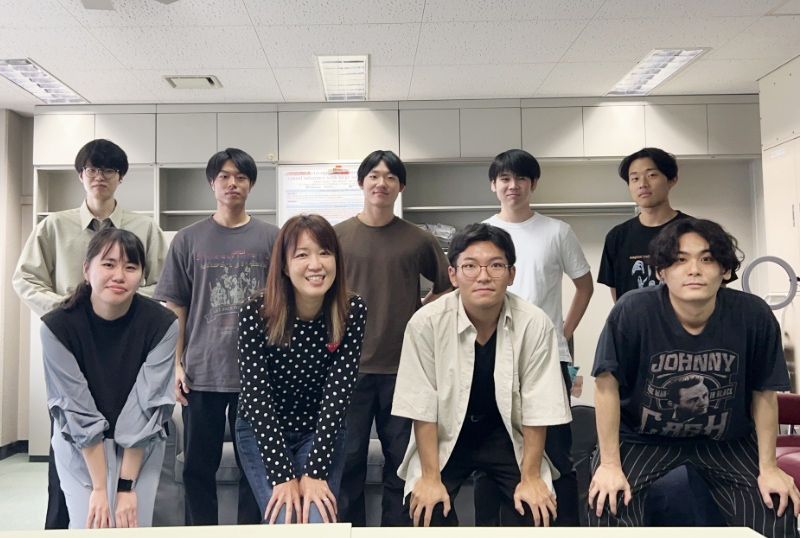Researcher Interviews Vol.62024.12.13
Toward a society enriched through human-AI collaboration—designing systems that harmonize individual wishes with society-wide purposes

SAKURAI Yuko
Professor
Computer Science Group
Continue research while keeping up with the speed and maintaining a high level of originality
- Fields of Research:
- Field of Computational Intelligence / Informatics / Intelligent informatics
- Research Keywords:
- Artificial intelligence, multi-agent system, market design
QWhat kind of research are you doing?
My research is mainly about multi-agent systems, which is one domain of artificial intelligence (AI) research. An agent here means an entity capable of autonomous action, such as humans and AI. In multi-agent system research, we try to put the idea of “two heads—or multiple heads—are better than one” to practice on computers. One way to do this is to design mechanisms that allow multiple agents to effectively collaborate with one another. So we make proposals for optimal personnel placement in companies and schools or how to protect resources (such as airports and schools) from attacks. We also design fair evaluation methods of individuals and organizations that provide data and computational resources for machine learning.

QWhat inspired you to pursue a career in research?
I decided to pursue a career in research for a simple reason: Upon completing my master’s program, I joined a company and was assigned to a division that was conducting research in AI and multi-agent systems. Later, I was involved in network development, and I realized that I was more suited to research, where I can set my own challenges and propose solutions. So I have returned to academia.
QCould you share with us tips that can help students find their own research themes?
I often say to students who are looking for their research themes that it is essential to look around and identify problems in their everyday life. This is because that is where their original experience lies and it leads to originality in their research. Finding problems to solve in familiar situations in your immediate environment motivates you to acquire new skills relating to artificial intelligence and multi-agent system technologies as potential solutions. This is my third year at NITech, and I have been fortunate to have many students who have made great achievements, such as winning the Best Student Award at an international conference and coming second in an international competition related to multi-agent systems. It is very challenging for students to write papers and prepare presentations for international conferences, but when I see them interacting with researchers from overseas, I am impressed and moved by their progress. So I make sure to encourage students to conduct research projects while keeping in mind the possibility of presenting their results at international conferences.

QWhat do you find interesting about your research, what difficulties have you faced, and what is your focus as a researcher?
Since my major was in mathematics up to the master's program, I had absolutely no knowledge about information engineering and no programming skills when I first started research. Those were the days when I had no idea what my boss was saying, and I still remember how bad I felt about myself. But around the time I obtained my first tangible research results and had the experience of reading my paper at an international conference, I began to realize how interesting research was. I believe that it is important that researchers maintain a sincere attitude toward the tasks and questions we are tackling.
QTell me about your future goals (both research and life-related).
R&D in artificial intelligence is progressing rapidly. I hope to continue my research while keeping up with the speed and maintaining a high level of originality. I think it is important to conduct research in the future while tackling the challenge of facilitating people’s encounter with AI. So I hope to continue my research not just to develop new AI-aided technologies but while giving consideration to how these technologies affect people. I would also like to engage in activities that communicate the attractiveness of information engineering to students who are interested in the domain. As for my private life, I have a little more free time now that my parenting has passed the most demanding period. So I have resumed playing the piano, which I used to take lessons for up until high school. I hope to learn to play many pieces.

Career summary
Upon graduating with a Master’s degree from the Graduate School of Mathematics, Nagoya University, in March 1997, Prof. Sakurai began working at NTT in April 1997 and was attached to the NTT Communication Science Laboratories in August of the same year. Later, she returned to graduate school and completed the doctoral program at the Graduate School of Information Science and Electrical Engineering, Kyushu University, in March 2006, obtaining a Ph.D. in Engineering. After working in different roles at Yahoo Japan Corporation and Yahoo! JAPAN Research, she was appointed Associate Professor at the Graduate School of Information Science and Electrical Engineering, Kyushu University, in March 2011. In April 2017, she joined the Artificial Intelligence Research Center, National Institute of Advanced Industrial Science and Technology (AIST), as a Senior Researcher. She has been a Professor in the Department of Computer Science at Nagoya Institute of Technology since April 2022.
Hobbies and interests
Urban exploration (mainly visiting historic sites in Nagoya City, etc.), travelling
